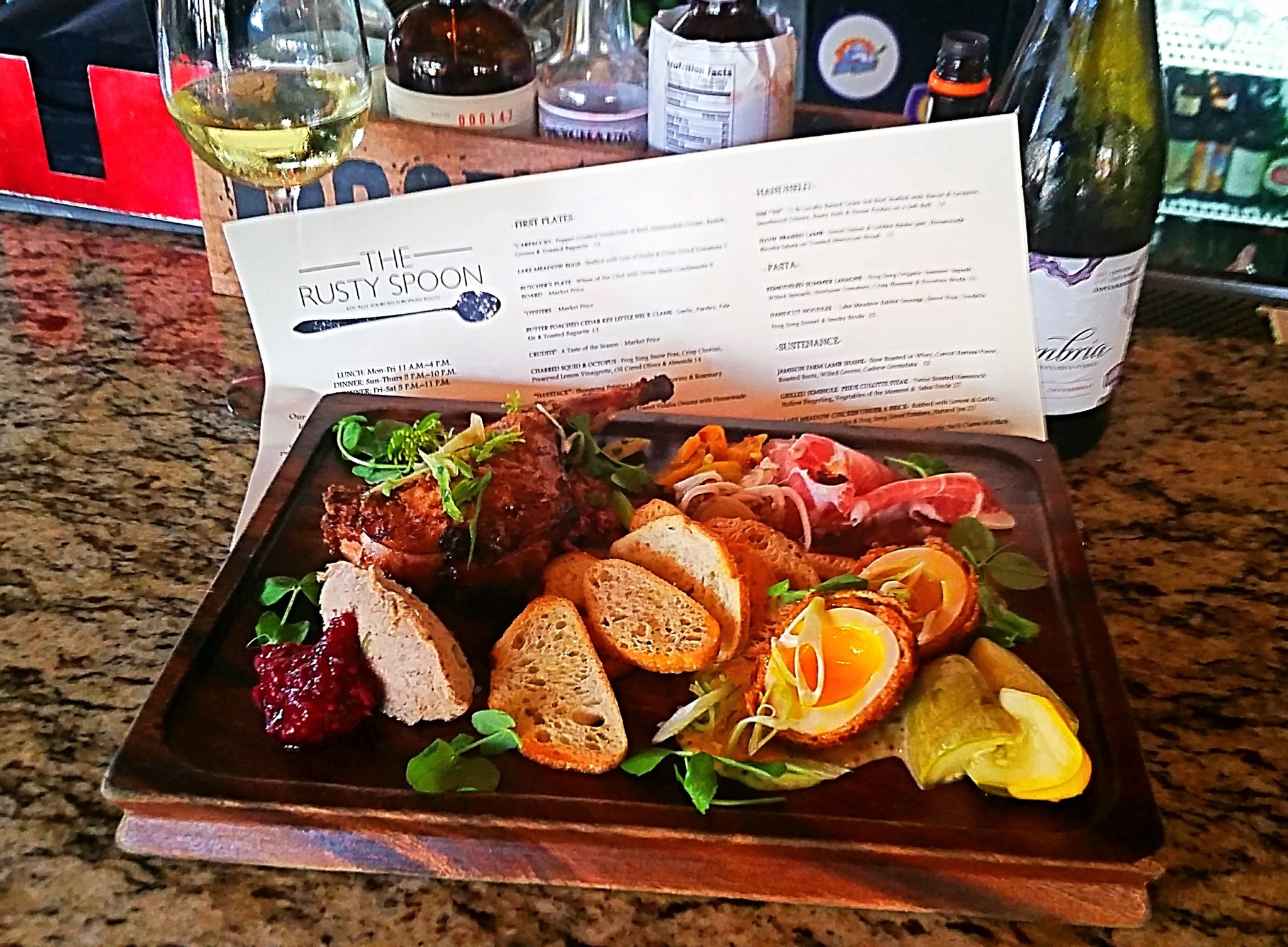By Chef Bob Aungst
As a Chef that has long embraced buying and supporting local farms and small businesses, I was very excited about visiting my friends William and Kathleen Blake at the Rusty Spoon. Kathleen is an incredible Chef and William is the epitome of professionalism and dedication. Together they have created an atmosphere that consistently delivers memorable culinary experiences. I was here to delve into their version of one of my favorite culinary treats: Charcuterie (pronounced: shahr-KOO-tuhr-ee).
Charcuterie is derived from the term ‘chair cuit’, which translates to mean ‘cooked meat’. Charcuterie is often considered the art and science of making cooked meat preparations with a special emphasis on pork. This ancient art, with origins dating back some 6,000 years, became popular during the Roman Empire when cuisine started to become more of an art form. It really hit its stride in France during the Middle Ages when the lack of refrigeration made preserving foods through other means a necessity.
Chef Kathleen’s support of local farms like Palmetto Creek, Waterkist Farms, Lake Meadow Naturals, and many others, give her food the freshness that a true foodie will love. I’ve run into William many times at the Winter Park Farmers Market where we were both picking up the freshest of produce locally available. The Rusty Spoon truly is a “farm-to-table” eatery, and it clearly shows in the food quality.
Having a particular interest in charcuterie during my most recent visit, I ordered the Butcher Board. It was, as usual, phenomenal, and unique, with a fresh take on traditional, old world items. It featured Rabbit Wing, Pork Rillette, Cranberry and Blueberry Mostorda, Heirloom Tomato, Beet and Onion Relish, Dill Pickles and pickled Squash, Scotch Eggs and my favorite item: Capicola.
Capicola is a traditional Italian cold cut originating from the pork shoulder and neck. The muscle is dry cured and thinly sliced. The difference between capicola and ham or prosciutto is that it is not brined, or soaked in a salty liquid mixture for a period of time. The Rusty Spoon’s Capicola is sourced from “The Lady Butchers of Saucisson” in a Slavic Village in Cleveland, Ohio–a small artisan cured meat and sausage shop sporting the humorous #IHeartSwine moniker. Fittingly enough, Saucisson is the name of a large, thick French sausage.
Another item on the board was the Pork Rillette. A rillette (pronounced: ree-YEHTS) is similar to a pate. It’s usually made with pork belly or shoulder that’s been salted and cured, slow cooked, shredded, and combined with fat to form a paste. Rillettes can also be made from wild game, duck, goose, rabbit, and sometimes fish. Due to the nature and consistency of the paste, they are commonly spread on toast or bread. The former French county, Anjou, was notable for their rillettes, which were served to guests of honor in the shape of a pyramid, and topped with the pig’s tail. Keeping with tradition, The Rusty Spoon’s house made rillette was served in the traditional pyramid shape, sans the pig’s tail.
Mostarda (pronounced: mohs/TAHR/dah) is a northern Italian spread made from candied fruit and a mustard-flavored syrup. Traditionally, the condiment is served with boiled meats and cheese platters. Rusty Spoon’s Mostarda was delicious and definitely fresh, filled with local seasonal berries.
Like any true, “farm-to-table” establishment, the offerings in the charcuterie boards will change often based upon ingredients in season and meats available. It’s a great way to taste-test some of the more adventurous foods, without getting stuck with an entree-sized portion of something that’s out of your normal comfort zone. The Rusty Spoon is an excellent place to begin or renew your culinary journey with charcuterie!
——-
Chef Bob Aungst is a freelance chef based out of Maitland, Florida. During his thirty-year career, Aungst has served three U.S. Presidents, countless political leaders, professional athletes, and celebrities. He is passionate about really great food that’s well-made from the finest ingredients. Chef Bob will be writing a series of guest posts for Bungalower in an attempt to simplify “chef speak” into plain English, while highlighting the many fantastic food options in the heart of Orlando.
In addition to corporate and private catering, Chef Bob also focuses on gluten free recipe development and restaurant education, and his private label lines of locally roasted coffees and hand crafted gluten free flours. More information is available at www.RocksSticksAndHell.com.

